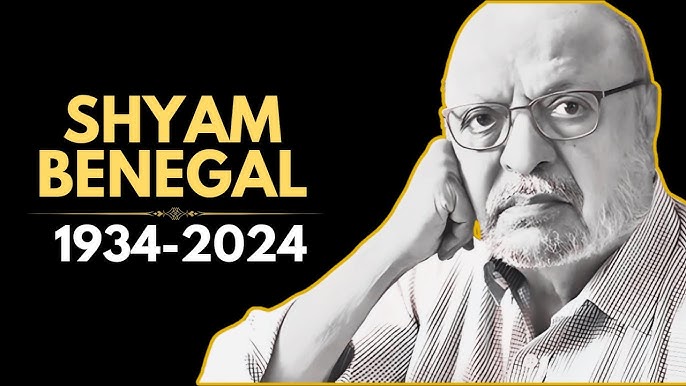Shyam Benegal (1934-2024), who expertly exploited cinema as a weapon of social transformation, has passed away.

News Mania Desk / Piyal Chatterjee / 24th December 2024
Shyam Benegal, who initiated a transformative phase in Hindi cinema with the ‘parallel movement’ during the 1970s and 1980s through masterpieces like Ankur, Mandi, and Manthan, passed away on Monday, December 23, after a prolonged struggle with chronic kidney disease. He was ninety.
The director, a luminary in the realm of Indian cinema’s illustrious creators, passed away at Wockhardt Hospital in Mumbai, where he had been hospitalized in the Intensive Care Unit (ICU). “He died at 6:38 PM at Wockhardt Hospital in Mumbai Central.” He had been enduring chronic kidney disease for many years, but it had worsened significantly. “That is the cause of his death,” his daughter Pia Benegal explained to the media. He is survived by his wife, Nira Benegal, and their daughter.
Only nine days earlier, on his 90th birthday, actors who had collaborated with him over the years came together to celebrate the significant occasion, almost as a final farewell to the director who had offered them some of the finest roles of their careers. Among the attendees were Shabana Azmi, who first appeared in the impactful Ankur in 1973; Naseeruddin Shah, Rajit Kapoor, Kulbhushan Kharbanda, Divya Dutta, and Kunal Kapoor. That picture of a grinning Benegal alongside his actors throughout the years is his final one in public.
Throughout his extensive career spanning nearly seven decades, Benegal navigated various realms, mediums, and topics, encompassing rural hardships, feminist themes, incisive satires, and biographical films. His work included documentaries, films, and grand television series, such as Bharat Ek Khoj, which is based on Jawaharlal Nehru’s Discovery of India, along with Samvidhaan, a 10-episode series about the creation of the Constitution.
And he wasn’t calling it quits anytime soon. “I’m working on two to three projects; they are all different from one another. It’s difficult to say which one I will make. They are all for the big screen,” Benegal said on the occasion of his 90th birthday. He also spoke of his frequent visits to the hospital and that he was on dialysis. “We all grow old. I don’t do anything great (on my birthday). It may be a special day, but I don’t celebrate it specifically. I cut a cake at the office with my team.” His films include Bhumika, Junoon, Suraj Ka Satvaan Ghoda, Mammo, Sardari Begum and Zubeidaa, most counted as classics in Hindi cinema.
His biographical films feature The Making of the Mahatma and Netaji Subhas Chandra Bose: The Forgotten Hero. The director’s latest project was the 2023 biopic Mujib: The Making of a Nation. He was also eager to depict the story of Noor Inayat Khan, the covert WW II operative. Unfortunately, that dream will stay unaccomplished.

Benegal’s Manthan, depicting Varghese Kurien’s dairy cooperative initiative in Anand, Gujarat, featuring Smita Patil, Girish Karnad, and Naseeruddin Shah, was restored and showcased in the Cannes Classics section in the French Riviera in May this year. Tributes to Shyam Babu, as friends and colleagues called him, who transformed the norms of Indian cinema, flowed in. President Droupadi Murmu expressed sadness over Benegal’s death, stating that his departure signifies the conclusion of a remarkable era in Indian cinema and television. Murmu stated that Benegal initiated a new form of cinema and created multiple classics. “An authentic establishment, he mentored numerous actors and creatives.” His remarkable contribution was acknowledged through various awards, such as the Dadasaheb Phalke Award and Padma Bhushan. “My heartfelt sympathies go out to his family and his numerous fans,” the President stated in a message on X.
The Congress mourned the demise of Benegal, with party leader Mallikarjun Kharge stating that his significant contributions to the art, characterized by thought-provoking narratives and a deep dedication to societal concerns, made a lasting impression. Filmmaker Shekhar Kapur stated that Benegal established ‘new wave’ cinema and will be remembered as the individual who transformed the trajectory of Hindi cinema through films such as Ankur and Manthan. “He made stars from talented actors such as Shabana Azmi and Smita Patil.” “Goodbye, my companion and mentor,” he said.
“If there is one thing Shyam Benegal expressed best: it was the poetry of the ordinary face and ordinary lives,” director Sudhir Mishra said. “Much will be written about Shyam Benegal, but for me, not many talk about the fact that there was a lament in his films and a sadness about the fact we were not living in the best of all possible worlds,” he added.
Director Sandip Ray described the death of Benegal as a personal loss for the Ray family, recalling that the ace director had made a documentary on his father, the legendary Satyajit Ray, whom he affectionately called ‘Manikda.’ Sandip remembered how the two shared a warm, personal bond that deepened after the filmmaker made Ankur. He also recalled how renowned filmmaker made the documentary on Satyajit Ray, one of the most comprehensive works on his father’s life and career, and showed a keen interest in the restoration of Ray’s films. Sandip shared an anecdote where Benegal once remarked, “There is only one Ray.”
Hailing from Tirumalagiri, currently located in Telangana, Benegal was surrounded by cinema during his upbringing. His dad was a still photographer who also created short films. He was additionally a second cousin of the film icon Guru Dutt. Benegal completed his master’s in economics at Osmania University in Hyderabad. He intended to pursue a career in teaching but chose not to. The young Benegal quickly relocated to Mumbai in search of employment and initially considered helping Guru Dutt but abandoned that notion since he had his own vision.
Subsequently, he began working as a copywriter at an ad agency. Eventually, his agency moved him to the film division, recognizing his passion for the medium, where he started creating ad films before transitioning into a full-time filmmaker. He subsequently created documentaries for the Films Division of India prior to his feature film debut with Ankur. Benegal’s approach to filmmaking was both intensely personal and fundamentally political. Narrating tales of class and caste conflicts, feminist issues, rural hardships, and community interactions. The gaze was sharp, the themes significant, and the approach occasionally grave while at other times being mocking. If Kalyug is a contemporary reinterpretation of the Mahabharata, Bhumika is an intense portrayal of a female film star and her frequently exploitative relationships, Mandi examines a brothel and its residents who skillfullymaneuver the men in their lives, while Welcome to Sajjanpur, centered on a hopeful novelist turned letter writer, is a clear satire.
Benegal disliked the term “middle cinema” used to bracket his films and preferred that his work be called “new or alternate cinema”. “I don’t remember who said this: ‘Every social act of yours is also a political act whether you like it or not’,” he told PTI in 2022. “One has to be as objective as possible and the second point is to be sympathetic. If you are not objective, you are already colouring the story with your subjectivity. Sympathy is necessary. When I say sympathy, I mean empathy so you can be one with the subject,” Benegal said.
His was the cinema of and by the erudite, attracting some of the most talented in the business. The late playwright Vijay Tendulkar wrote the screenplay Manthan and Nishant. The late music composer Vanraj Bhatia, cinematographer Govind Nihalani and the great theatre director Satyadev Dubey worked with him in multiple films. Girish Karnad wrote the screenplay for Bhumika and Ruskin Bond for Junoon.
Benegal was understated about his achievements. “There are people who have done wonderful things. There’s nothing unique in what one has done. You do what you think you want to do. That’s not unique. Climbing Mount Everest is unique,” he said.






